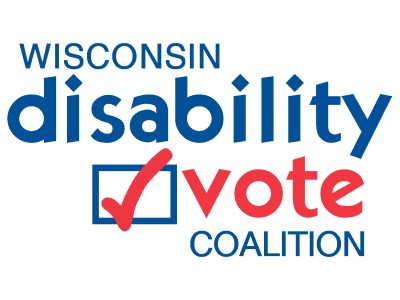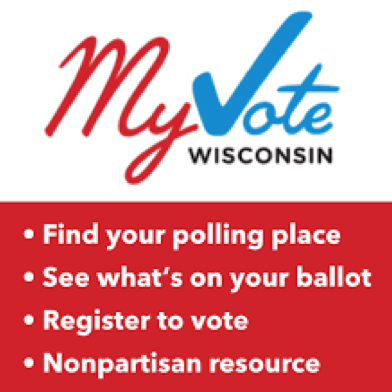
|
|
|
The Wisconsin Disability Vote Coalition is a non-partisan effort to help ensure full participation in the electoral process of voters with disabilities.
|
|
|
|
February 15th Election: Resources for Voters with Disabilities
|
February 15th is the Spring Primary in some areas of Wisconsin. The Wisconsin Disability Vote Coalition urges voters with disabilities to check on MyVote Wisconsin to determine if they have a primary, and to make a plan to vote.
|
Do you have a February 15th primary? Be prepared:
|
- Check MyVote Wisconsin for your polling place as it may have changed
- Contact your clerk today regarding any accommodation needs
- Bring a photo ID to your polling place.
|
|
|
|
If you are voting absentee, your ballot must arrive no later than 8 PM on election day to be counted. For the February 15th primary, voters may follow the long standing practices of absentee ballot return. These include returning absentee ballots to a secure drop box or to your clerk, or requesting that another person of the voter’s choice return their completed absentee ballot to a drop box, to the clerk’s office, or to the voter’s polling place. Check with your clerk on where to return your ballot.
|
|
|
|
|
The Disability Rights Wisconsin Voter (DRW) Hotline is available to answer your voting questions. Call the Hotline at 844-DIS-VOTE/ 844-347-8683 or email info@disabilityvote.org. The Hotline can help voters check their registration and polling place; explain options for absentee ballot return, photo ID requirements, and disability related accommodations; and assist with voting rights concerns. Our Spring Election Toolkit and other resources are on the Disability Vote Coalition website.
|
|
|
|
Voters with disabilities should know their rights. To ensure that our voting process is accessible to all, disabled voters have the right to request accommodations, including the following:
|
- Curbside voting should be available at every polling place for voters who have difficulty entering their polling place due to a disability, due to being immunocompromised or having symptoms of COVID-19. Two poll workers will bring a ballot to the voter, and conduct voting at their vehicle, or at the polling place entrance. Proof of identification is required. If a voter is not registered, proof of residence must be provided. Voters should contact their clerk today about how to access curbside voting.
- If a voter needs help marking the ballot, they may have a person of their choice assist them. That person does not need to be qualified to vote. The voter may bring someone with them or request assistance from a poll worker. The assistor cannot be the voter’s employer or union representative.
- If a voter inside the polling location cannot sign the poll list due to a physical disability, they should inform a poll worker. The poll worker will write “Exempt by order of inspectors” in the signature space on the poll list.
- An accessible voting machine should be available at every polling place. This machine will allow voters to independently mark the ballot. They should be set up to allow voters who use a wheelchair to reach the controls, and have an audio ballot-marking option for voters with a visual disability.
- The poll worker may ask voters to speak their name and address. If a voter is unable to state their name and address, Wisconsin law allows voters to have poll workers or assistors of their choosing state their name and address on their behalf prior to receiving a ballot. Voters can also provide their information in writing to poll workers or assistors.
- Other reasonable accommodations can be requested. Speak to the chief inspector at your polling place.
A voter with a disability cannot be turned away from the polls because a poll worker thinks they are not ‘qualified’ to vote. Disability or medical diagnosis does not take away the right to vote. Only the courts can take away that right.
|
|
|
|
|
If a voter experiences an accessibility or voting rights concern, it is important to report it. Concerns should be reported to the Chief Election Inspector at the polling place or to the Municipal Clerk. We also recommend reporting the concern to the Wisconsin Elections Commission at elections.wi.gov/form/accessibility-complaint. The DRW Voter Hotline (844-347-8683) is also available to help voters who have a complaint.
|
|
|
|
|
February 11th Wisconsin Supreme Court Ruling
|
The February 11th Wisconsin Supreme Court ruling will restrict practices for absentee ballot return for the April 5th election. We will provide additional guidance once it is available.
|
The ruling does not change anything for the February 15th primary election. Voters may still follow the long standing practices of absentee ballot return for the February 15th primary. These include returning absentee ballots to a secure drop box or requesting that another person of the voter’s choice return their completed absentee ballot to a secure drop box, to the clerk’s office, or to their polling place.
|
|
Disability Rights Wisconsin issued a statement on the February 11th ruling.
|
|
|
|
Help is available! Contact these resources:
|
- DMV Voter ID Hotline: (844) 588-1069. Apply for a free Photo ID for voting at the Wisconsin Division of Motor Vehicles (DMV).
- Vote411.org and ballotpedia.org: nonpartisan information about the candidates
|
|
|

|
|
|
|
|